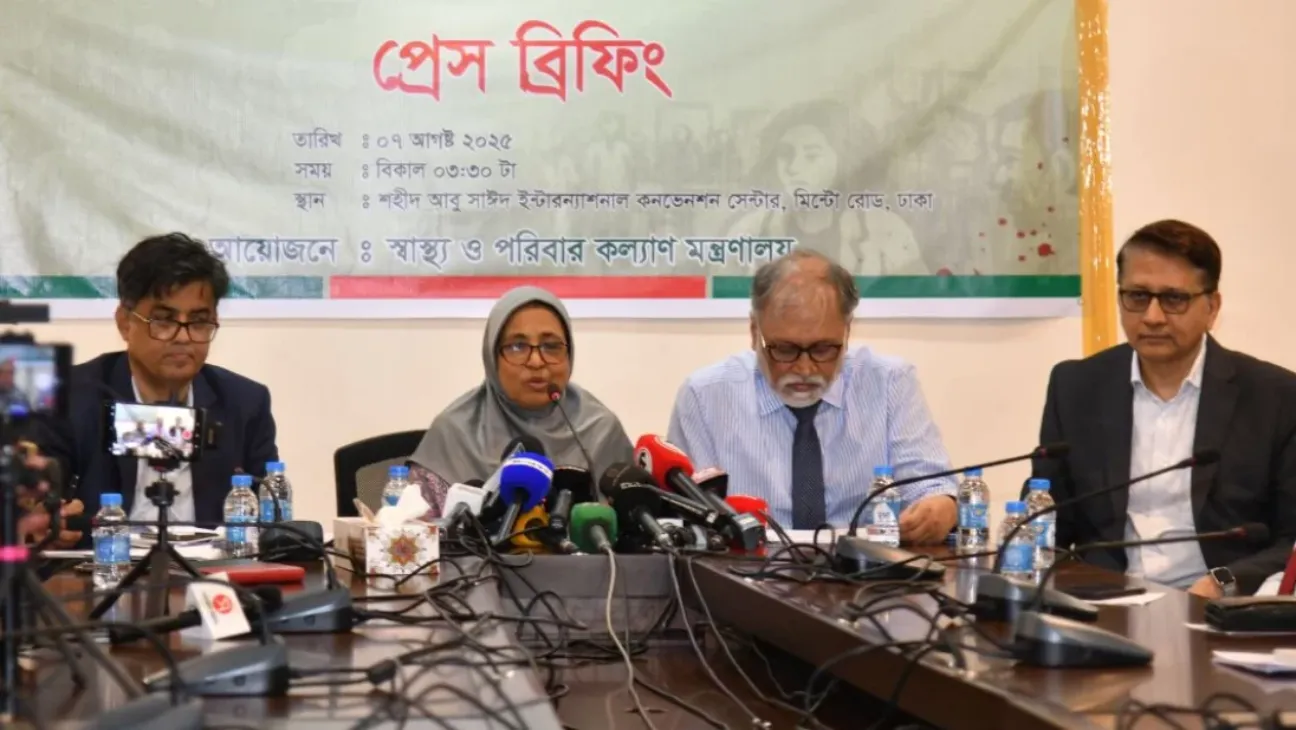The government is preparing to introduce a new Health Protection Act, aiming to overhaul key aspects of Bangladesh’s healthcare system, according to Health Adviser Nurjahan Begum.
Speaking at a press briefing Thursday afternoon in Dhaka, Begum outlined a broad set of reforms, including free treatment for thousands of July movement victims, a digitalization push, and ongoing recruitment of doctors and nurses. She also highlighted the country’s first robotic physiotherapy center, foreign medical assistance, and upcoming legislation.
The press briefing was held at the Shaheed Abu Sayed International Convention Centre and began with tributes to those killed in the July uprising. The adviser emphasized that treating those injured in the July events remains a top priority.
“It is through the sacrifice of these martyrs that we have gained a new Bangladesh,” she said. “Ensuring proper treatment for the injured and supporting their families were the top priorities of the interim government.”
Since August 2024, a 13-member inter-ministerial committee has listed more than 14,000 injured individuals. Of those, 12,042 were officially recognized and received full, free treatment at government hospitals. Seventy-eight patients have been sent abroad to Thailand, Singapore, and Russia for specialized care.
To assist in complex medical procedures, 26 specialist doctors from the UK, Nepal, China, Singapore, the US, France, and Thailand have arrived in the country. They’ve performed surgeries on eyes, limbs, and spinal injuries. Nepal donated 40 corneal tissues, with two already transplanted successfully.
One of the major highlights was the launch of the country’s first robotic physiotherapy center at Bangladesh Medical University. Built with support from China, the facility includes 62 robotic units, 22 powered by AI. It can treat up to 300 patients a day and will eventually be open to the general public.
Addressing staff shortages, Begum said the government has begun recruiting through the 48th special BCS, with 3,000 doctors to be hired. An additional 3,500 doctors are also in the pipeline. Meanwhile, 3,512 senior staff nurses have been recruited and are awaiting placement. Proposals to create 5,000 new nurse positions and 4,000 for midwives are under review by the Finance Ministry.
7,000 doctors will be promoted through new supernumerary posts to enhance career progression. Of these, 800 have entered professorships in 86 medical specialties. Other hospital and institute restructuring involve a number of higher-level posts.
On the legislative front, the government has cleared a draft Human Organ Transplantation Ordinance 2025 which is now with the Ministry of Law for vetting. Preparations are also underway on the coveted Health Protection Act, which is one of the recommendations from the Health Reform Commission.
Also Read: Bangladesh Dengue Update: 3 More Deaths, 408 New Cases in 24 Hours | August 2025
New hospitals are being planned with Chinese grants, including a 1,000-bed facility in Rangpur and two 500–700-bed specialty hospitals in Dhaka North and Chittagong.
Digital transformation efforts are also underway. A proposal supported by the Asian Development Bank to digitalize the health system has been submitted to the Economic Relations Division. The government is also exploring the One Health initiative with potential funding from the World Bank to address climate-related and zoonotic diseases.
Some price reforms were also announced. “You are aware that the prices of coronary stents have been reduced,” said Begum. “The price of stents has been cut by up to 36%. Hospitals have been instructed not to charge more than 5% as service fees.”
Taxes on imports used in producing anti-cancer drugs have been reduced from 5% to 2%. Meanwhile, e-cigarette imports have been banned as of January 1 following a proposal by the Health Services Division.
Begum also addressed the plane crash involving Milestone School and College. So far, 34 people have died, and 34 others are still receiving treatment. Foreign specialists from Singapore, China, India, and the UK are helping local doctors.
To support mental health, emergency hotlines, a dedicated psychiatric cell, and special inpatient beds have been set up. A committee has been formed to provide long-term mental health support to affected students, teachers, and families.
“The government is overhauling the healthcare system,” she said. “Our goal is to ensure access to quality healthcare at low cost for the general public.”









